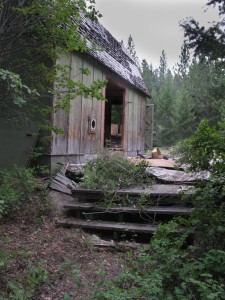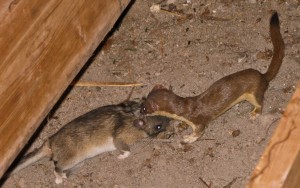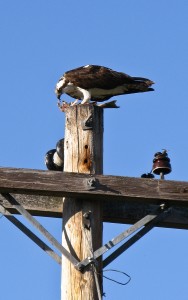Avalanche of color
falls from the high mountain peaks
autumn cascades down.
 I have come to the homestead to escape my garden. For weeks now I have been harvesting and freezing and canning, putting by against the long winter. Here, by the old barn the leaves of the wild roses and the serviceberries are just starting to turn, the tips of the larch needles lighting up with a pale yellow glow and the berries on the kinnikinnick are juicy with red. It is mellow and peaceful here, away from the city where “the world is too much with us; late and soon/getting and spending we lay waste our powers.” ( Wordsworth)
I have come to the homestead to escape my garden. For weeks now I have been harvesting and freezing and canning, putting by against the long winter. Here, by the old barn the leaves of the wild roses and the serviceberries are just starting to turn, the tips of the larch needles lighting up with a pale yellow glow and the berries on the kinnikinnick are juicy with red. It is mellow and peaceful here, away from the city where “the world is too much with us; late and soon/getting and spending we lay waste our powers.” ( Wordsworth)
It is mellow and peaceful that is, until a great clattering arises from the barn. Small urgent feet scrabbling over loose boards, banging and thumping and then a high pitched squeal, the sound so long and sharp it keeps me nailed to my chair before it ends.
Silence once again and I move slowly to the barn door to peer in. At first I don’t see anything but the heaps of dried greenery and old boards in the packrat midden. Then a flash of movement out of the corner of my eye and I spot a long tailed weasel, his jaws in a vice grip on the neck of a lifeless packrat. His shiny little eyes are fixed on me and the moment I turn my head he lets loose his prey and scurries out of sight. I retrieve my camera and then stand at the door as still as possible, the lens aimed at the hapless packrat. I can see his massive nest-cache beyond, something silver and shiny peeking out from the foliage, a long string of red carpet thread, a brass coat hook, the pink puffballs of chewed up insulation and a half dozen cassette tape cases, the long streamers of shiny brown tape in ribboned tangles. It is months worth of gathering, harvesting all those branches of leaves, but also a strange hoarding of glittery, colorful baubles with no purpose.
Eventually the weasel returns and I freeze in place, snapping pictures as the weasel circles, as if considering an engineering problem. He is smaller than the carcass. At last he latches on to the packrat’s neck and begins to drag the bounty away to the abandoned burrow of another mammal where he lives. There will be no caching and hoarding for the weasel though. He will feed on the packrat for at most a couple of days, then return to the hunt. He must eat a third of his body weight each day.
One last look at the abandoned packrat nest. I leave shaken, not by the violence of the small death I witnessed, but by the now useless nest and the life of the hoarding packrat. I drive back to my own overflowing nest of home.
 Perched on the thin cross-rail of the power line pole the osprey stands, silvery fish clasped in her talons, balancing on the slippery scales as she pecks and pulls at the stringy entrails. She is on the verge of a big change, a migration from the land where she raised her chicks in the big stick nest down the road.
Perched on the thin cross-rail of the power line pole the osprey stands, silvery fish clasped in her talons, balancing on the slippery scales as she pecks and pulls at the stringy entrails. She is on the verge of a big change, a migration from the land where she raised her chicks in the big stick nest down the road.
Her grown chicks circle over the river, diving awkwardly toward the water on barely tested wings. The larger one strikes the silver surface of the river, but he rises again with empty dripping talons. The mother osprey looks up from her meal, watches as the other chick makes a dive. He pauses, flailing on the surface of the river, thrashing his wings, but whatever he thought he’d grasped squirmed away and he returned to his slow circling over the water.
The osprey repositions herself on the fish beneath her, tilts a bit to the side as it seems to slip off the pole, but her grip is tight–her sharp claws dug deep in its flesh and balanced again, she thrusts her beak deep into the meat, ripping it from the carcass in great chunks, throwing her head up to let them slide down her gullet. She seems to be taking great pleasure in this solitary meal, no longer needing to regurgitate it for her chicks, confident that despite their awkward attempts , hunger would focus their skill.